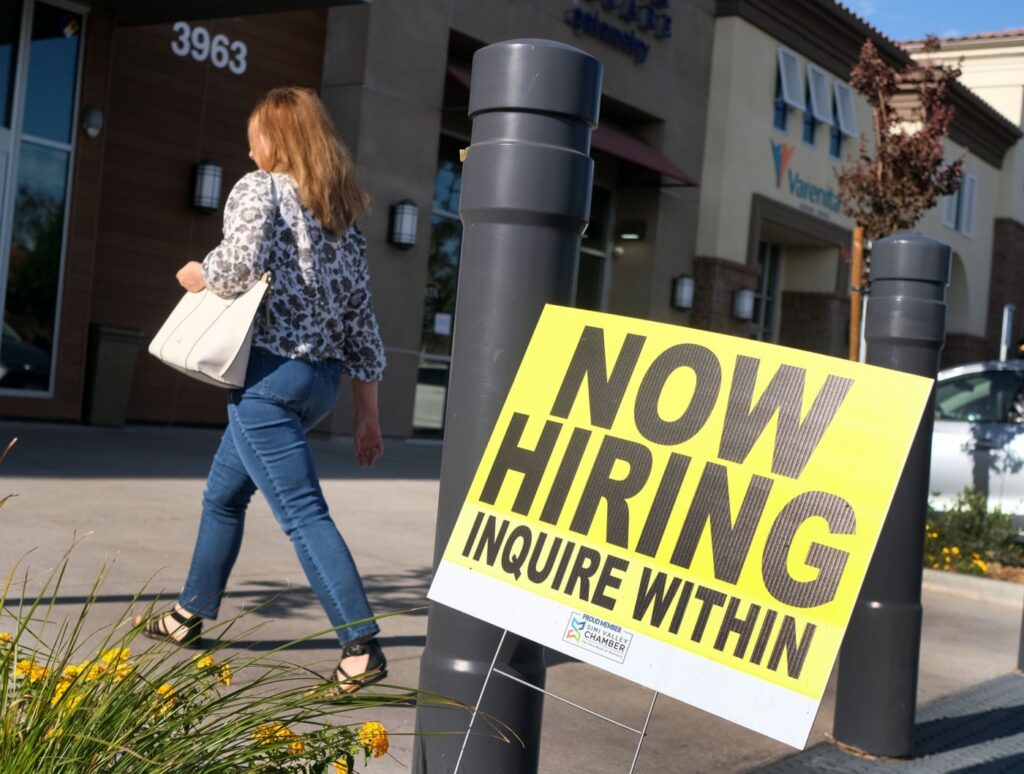
Millions of Americans have quit their jobs each month over the last year and a half — essentially ever since vaccines reduced the frequency and intensity of bouts with most variants of COVID-19.
At the same time, some California cities emptied at generationally high rates, with San Francisco the best example, losing more than 6% of its populace to the new white-collar reality of working at home, with location almost completely irrelevant.
Workers can be in Montenegro as easily as Montebello, and hardly anyone will know the difference.
This creates unprecedented worker mobility all over the country, as huge numbers take months or years off and survive on savings or fortunes accumulated via stock options over the last 15 years.
It also causes many of the “help wanted” signs appearing in the windows of myriad workplaces, from post offices to Starbucks, small bakeries, customer service telephone centers and restaurants. It means shorter menus, too, as cooks and chefs are hard to find. It’s also a time of finding your own merchandise at big box stores, helpful salespeople now scarcer than ever. Radio ads even offered $3,000 signing bonuses to new bus drivers in Los Angeles, treatment normally reserved for individuals with specialized abilities and training.
Since California leads the nation in almost every social and economic trend, good or bad, the expectation might be that more folks are resigning their jobs here than anywhere else. That presumption would be dead wrong.
New findings from the WalletHub website, which tracks a variety of economic trends, show California ranks as the No. 38 state in resignations. Just 2.53% of workers here have quit their jobs over the last year, the website found.
Florida, whose governor continually compares his state to California, ranked fourth in resignations, as almost twice as high a proportion of its populace quit. Texas was 28th, while Alaska led the great resignation, with a 4.7% annualized rate of departures. Maybe it’s the cold, dark winters and physical isolation that comes with living in most parts of that physically huge state.
Why is California faring better than the vast majority of other states in this societal upheaval?
It may be the long experience of the tech industry with gig workers, who for many years have moved around frequently while hunting for ever greener pastures.
Where in most states there is a large pay gap between job shifters and long-term workers, that is much less common in California. Nationally, says the Cantabria economic blog, the average pay differential is 7%, with — for example — the median salary for established software development managers at $131,000, while new hires in the same job get a median pay of $143,000 regardless of age or experience.
To avoid that differential, which can spur resentful longtime employees to search for new jobs, companies must constantly grant raises and bonuses to existing workers so newcomers don’t outpace their pay. If those firms then hit unexpected hard times, it can lead to layoffs, which lately have hit companies like Meta and Salesforce.
The almost constant upward momentum all this created over the last 20 months is one reason U.S. wages overall rose 4.7% in that time.
Related Articles
Prosecuting Julian Assange is a threat to press freedom
Which path will Kevin McCarthy take?
The Unhappy Meals a council would create
How did confidential gun permit data get leaked?
Orange County supervisors must explain $78 million health campus
Many California companies are long accustomed to these phenomena, which created massive new wealth for youthful high tech workers at companies like Google and Apple and Hulu. Most Silicon Valley companies see to it that longer-term employees are at least as well off as new hires. Failure to do that would lead to shuffles and a much higher California resignation rate.
Women, too, are using the great resignation to eliminate much of the longtime pay gap between themselves and men. CNBC reports 85% of women workers believe they deserve pay increases and 65% think the resignation wave gives them more leverage to get them.
Of the 47 million Americans who quit jobs in 2021, most of those responding to surveys cited better pay and benefits as reasons. It’s still unknown if women actually reduced the pre-existing 18% pay gap between them and White males in similar jobs.
All this may be inconvenient for businesses, but it’s also providing bonanzas for many thousands of workers.
Email Thomas Elias at tdelias@aol.com.
